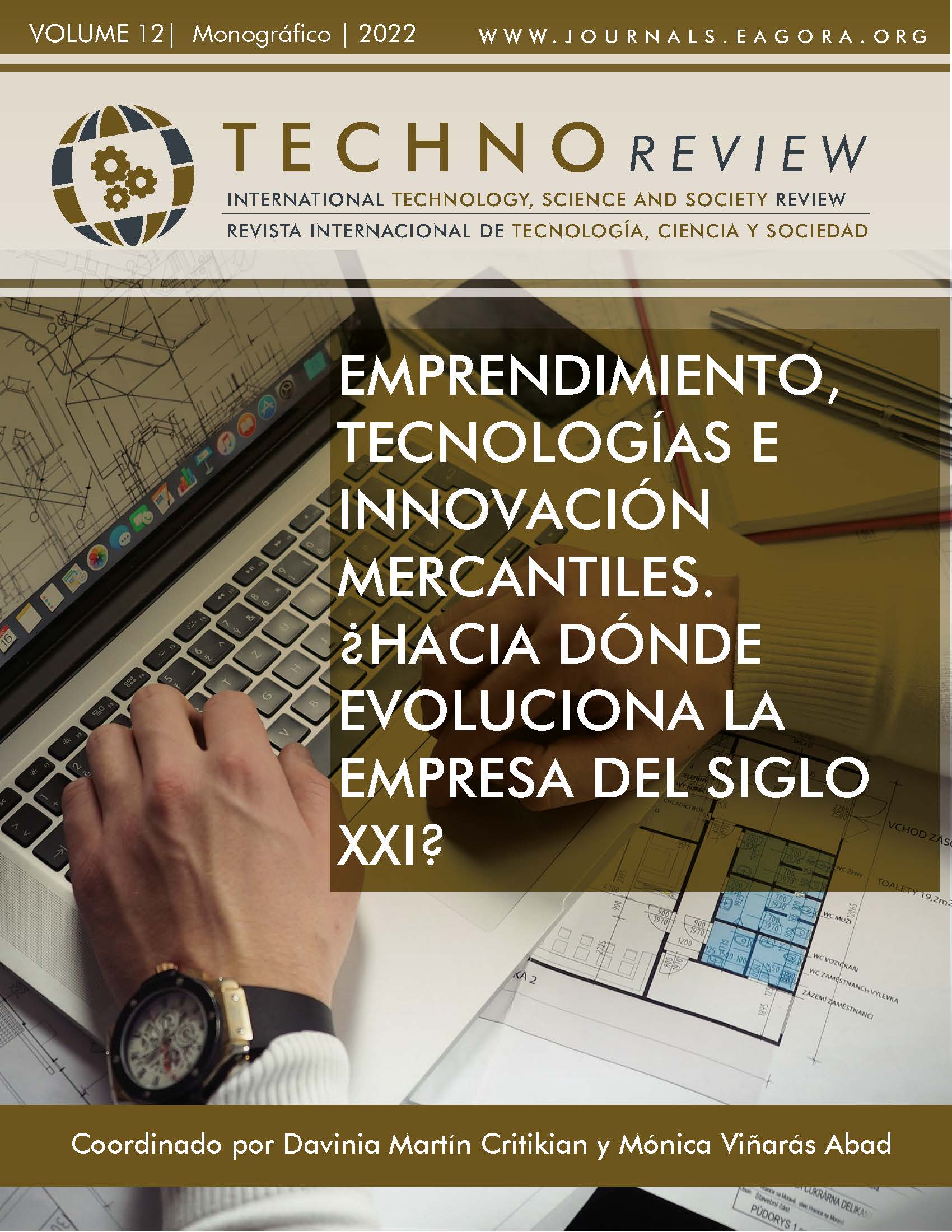Estudio sobre la Intención emprendedora en estudiantes del grado en Trabajo Social
Intención emprendedora en estudiantes de Trabajo Social
DOI:
https://doi.org/10.37467/revtechno.v11.4475Palavras-chave:
Intención emprendedora, Educación para el emprendimiento, Trabajo Social, Regresión logística, Factores para el emprendimientoResumo
Se presenta un estudio de los determinantes de la intención emprendedora (IE) en estudiantes universitarios del Grado en Trabajo Social en el inicio de su educación para el emprendimiento. Los datos obtenidos de una muestra de estudiantes de la asignatura “Gestión de las Organizaciones”, incluida en 3er curso del Grado de la Universidad de Zaragoza (España). Participaron 139 estudiantes de los 184 matriculados. Se utilizó un modelo de regresión logística para analizar la relación entre esos factores y la variable binaria que expresa la IE del estudiante. Se identificó influencia significativa en Responsabilidad, Creatividad y Autoconocimiento, con efecto positivo.
Referências
Aadland, T. & Aaboen, L. (2018). Systematising higher education: a typology of entrepreneurship. In Hytti, U., Blackburn, R. & Laveren, E. (Eds), Entrepreneurship, Innovation and Education: Frontiers in European Entrepreneurship Research, 103-122. Edward Elgar Publishing.
Akinbola, O. A., Ogunnaike, O. O. & Amaihian, A. B. (2020). The influence of contextual factors on entrepreneurial intention of university students in Nigeria. Creating Global Competitive Economies, 1-3.
Bae, T. J., Qian, S., Miao, C. & Fiet, J. O. (2014). The relationship between entrepreneurship education and entrepreneurial intentions: A meta–analytic review. Entrepreneurship Theory and Practice, 38(2), 217-254.https://doi.org/10.1111/etap.12095
Baena-Luna, P., García-Río, E. & Monge-Agüero, M. E. (2020). Competent framework for entrepreneurship. A systematic review of the literature on its use and application. Inf. Tecnol, 31, 163-172. http://dx.doi.org/10.4067/S0718-07642020000200163
Barba-Sánchez, V. & Atienza-Sahuquillo, C. (2018). Entrepreneurial intention among engineering students: The role of entrepreneurship education. European Research on Management and Business Economics, 24(1), 53-61. https://doi.org/10.1016/j.iedeen.2017.04.001
Bosma, N. S. & Kelley, D. (2019). Global Entrepreneurship Monitor 2018/2019 Global Report.
Domínguez-Pachón, M. J. (2005). Cambios sociales actuales y adaptación de la profesión a los mismos. Humanismo y trabajo social, 4, 65-90.
Fayolle, A. & Gailly, B. (2015): The Impact of Entrepreneurship Education on Entrepreneurial Attitudes and Intention: Hysteresis and Persistence. Journal of Small Business Management, 53(1): 75–93. https://doi.org/10.1111/jsbm.12065
Fargion, S., Gevorgianiene, V. & Lievens, P. (2011). Developing entrepreneurship in social work through international education. Reflections on a European intensive programme. Social Work Education, 30(8), 964-980. https://doi.org/10.1080/02615479.2010.532206
Germak, A. J. & Singh, K. K. (2009) Social Entrepreneurship: Changing the Way Social Workers Do Business, Administration in Social Work, 34:1, 79-95.
Germak, A. J. & Singh, K. K. (2010). “Social Entrepreneurship: Changing the Way Social Workers do Business.” Administration in Social Work 34 (1): 79–95. DOI: 10.1080/03643100903432974
Gray, M., Healy, K. & Crofts, P. (2003). Social enterprise: Is it the business of social work? Australian Social Work, 56(2), 141–164. https://doi.org/10.1046/j.0312-407X.2003.00060.x
Hair, J.F., Anderson, R.E. & Tatham, R.L. (1987): Multivariate data analysis. New York: Macmillan Pub. Co.
Herman, E. & Stefanescu, D. (2017): Can higher education stimulate entrepreneurial intentions among engineering and business students? Educational Studies, 43(3), 312-327. https://doi.org/10.1080/03055698.2016.1277134
Hernández-Mogollón, R., Fernández Portillo, A., Díaz-Casero, J.C. & Sánchez-Escobedo, M. C. (2018). ¿Es posible trabajar la educación emprendedora universitaria en contextos poco favorables para ello? Journal of Management and Business Education, 1(2), 160-181.
Krueger, N. F. (2003). The cognitive psychology of entrepreneurship. En Zoltan J. Acs y David B. Audretsch (Eds.), Handbook of entrepreneurship research (pp. 105-140). Boston, MA: Springer.
Liñán, F. & Chen, Y. W. (2009). Development and cross–cultural application of a specific instrument to measure entrepreneurial intentions. Entrepreneurship Theory and Practice, 33(3), 593-617. https://doi.org/10.1111/j.1540-6520.2009.00318.x
Liñán, F., Rodríguez-Cohard, J. C. & Rueda-Cantuche, J. M. (2011). Factors affecting entrepreneurial intention levels: a role for education. International entrepreneurship and management Journal, 7(2), 195-218.
Michavila, F., Martínez, J. M., Martín-González, M., García Peñalvo, F. J. & Cruz-Benito, J. (2016). Barómetro de empleabilidad y empleo de los universitarios en España, 2015 (Primer informe de resultados). Observatorio de Empleabilidad y Empleo Universitarios.
Nandan, M. & Scott, P. A. (2013). Social entrepreneurship and social work: The need for a transdisciplinary educational model. Administration in Social work, 37(3), 257-271. https://doi.org/10.1080/03643107.2012.684428
Prince, M. J. (2001) How Social is Social Policy, Fiscal and Market Discourse in North American Welfare States. Social Policy and Administration, 35(1), 2–13. https://doi.org/10.1111/1467-9515.00216
Slater, S. (1995): Issues in conducting marketing strategy research. Journal of Strategic Marketing, 3(4), 257-270.
Teixeira, S. J., Casteleiro, C. M. L., Rodrigues, R. G. & Guerra, M. D. (2018). Entrepreneurial intentions and entrepreneurship in European countries. International Journal of Innovation Science, 10(1), 22-42. https://doi.org/10.1108/IJIS-07-2017-0062
Touriñán López, J. M. (2021). La ‘tercera misión de la universidad, transferencia de conocimiento y sociedades del conocimiento: una aproximación desde la pedagogía. Contextos educativos: CONTEXTOS EDUCATIVOS, 26 (2020), 41-81. http://doi.org/10.18172/con.4446
Vázquez-Burgete, J. L., Lanero, A. & Raisiene, A. G. (2012). Entrepreneurship education in humanities and social sciences: are students qualified to start a business? Business: theory and practice, 13(1), 27-35.
Vodă, A. I. & Florea, N. (2019). Impact of personality traits and entrepreneurship education on entrepreneurial intentions of business and engineering students. Sustainability, 11(4), 1(4):1192. https://doi.org/10.3390/su11041192
Downloads
Publicado
Como Citar
Edição
Seção
Licença
Os autores/as que publicam nesta revista concordam com os seguintes termos:
- Os autores/as terão os direitos morais do trabalho e cederão para a revista os direitos comerciais.
- Um ano após a sua publicação, a versão do editor estará em acesso aberto no site da editora, mas a revista manterá o copyright da obra.
- No caso dos autores desejarem asignar uma licença aberta Creative Commons (CC), poderão a solicitar escrevendo a publishing@eagora.org







